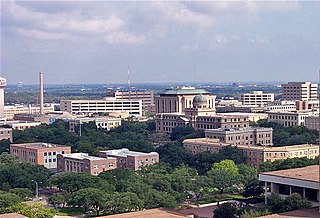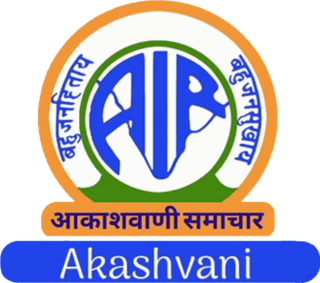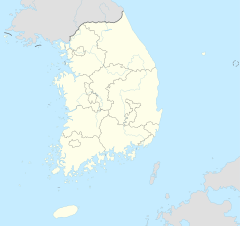
The International Space Station (ISS) is a large space station that was assembled and is maintained in low Earth orbit by a collaboration of five space agencies and their contractors: NASA, Roscosmos (Russia), ESA (Europe), JAXA (Japan), and CSA (Canada). The ISS is the largest space station ever built. Its primary purpose is to perform microgravity and space environment experiments.

The National Broadcasting Company (NBC) is an American commercial broadcast television and radio network serving as the flagship property of the NBC Entertainment division of NBCUniversal, a subsidiary of Comcast. The headquarters of NBC is in New York City at the Comcast Building. NBC also notably has offices in Chicago, Illinois at the NBC Tower within the area known as the Near North Side.

The PlayStation is a home video game console developed and marketed by Sony Computer Entertainment. It was released in Japan on 3 December 1994, followed by North America on 9 September 1995, Europe on 29 September 1995, and other regions following thereafter. As a fifth-generation console, the PlayStation primarily competed with the Nintendo 64 and the Sega Saturn.

The PlayStation 3 (PS3) is a home video game console developed and marketed by Sony Computer Entertainment (SCE). The successor to the PlayStation 2, it is part of the PlayStation brand of consoles. It was first released on November 11, 2006, in Japan, November 17, 2006, in North America, and March 23, 2007, in Europe and Australasia. The PlayStation 3 competed primarily against Microsoft's Xbox 360 and Nintendo's Wii as part of the seventh generation of video game consoles.

Fox Broadcasting Company, LLC is an American commercial broadcast television network owned by the Fox Entertainment division of Fox Corporation, headquartered at 1211 Avenue of the Americas in Midtown Manhattan. Fox hosts additional offices at the Fox Network Center in Los Angeles and at the Fox Media Center in Tempe, Arizona. Launched as a competitor to the Big Three television networks in 1986, Fox went on to become the most successful attempt at a fourth television network. It was also the highest-rated free-to-air network in the 18–49 demographic from 2004 to 2012 and 2020 to 2021, and was the most-watched American television network in total viewership during the 2007–08 season.

The American Broadcasting Company (ABC) is an American commercial broadcast television and radio network that serves as the flagship property of the Disney Entertainment division of the Walt Disney Company. ABC is headquartered on Riverside Drive in Burbank, California, directly across the street from Walt Disney Studios and adjacent to the Team Disney – Roy E. Disney Animation Building. The network maintains secondary offices at 77 West 66th Street on the Upper West Side of Manhattan, New York City, which houses its broadcast center and the headquarters of its news division, ABC News.

College Station is a city in Brazos County, Texas, United States, situated in East-Central Texas in the Brazos Valley, towards the eastern edge of the region known as the Texas Triangle. It is 83 miles northwest of Houston and 87 miles (140 km) east-northeast of Austin. As of the 2020 census, College Station had a population of 120,511. College Station and Bryan make up the Bryan-College Station metropolitan area, the 15th-largest metropolitan area in Texas with 268,248 people as of 2020.
Broadcast syndication is the practice of content owners leasing the right to broadcast their content to other television stations or radio stations, without having an official broadcast network to air it on. It is common in the United States where broadcast programming is scheduled by television networks with local independent affiliates. Syndication is less widespread in the rest of the world, as most countries have centralized networks or television stations without local affiliates. Shows can be syndicated internationally, although this is less common.

All India Radio (AIR), also known as Akashvani, is India's state-owned public radio broadcaster. Founded in 1936, it operates under the Ministry of Information and Broadcasting and is one of the two divisions of Prasar Bharati. Headquartered at the Akashvani Bhavan in New Delhi, it houses the Drama Section, FM Section, and National Service. It also serves as the home of the Indian television station Doordarshan Kendra.

The PlayStation Portable (PSP) is a handheld game console developed and marketed by Sony Computer Entertainment. It was first released in Japan on December 12, 2004, in North America on March 24, 2005, and in PAL regions on September 1, 2005, and is the first handheld installment in the PlayStation line of consoles. As a seventh generation console, the PSP competed with the Nintendo DS.

Sony Interactive Entertainment LLC (SIE) is a Japanese-American video game and digital entertainment company that is a major subsidiary of Sony Group Corporation. It primarily operates the PlayStation brand of video game consoles and products. It is also the world's largest company in the video game industry based on its equity investments.
A television station is a set of equipment managed by a business, organisation or other entity such as an amateur television (ATV) operator, that transmits video content and audio content via radio waves directly from a transmitter on the earth's surface to any number of tuned receivers simultaneously.
PlayStation Network (PSN) is a digital media entertainment service provided by Sony Interactive Entertainment. Launched in November 2006, PSN was originally conceived for the PlayStation video game consoles, but soon extended to encompass smartphones, tablets, Blu-ray players and high-definition televisions. It succeeded Sony Entertainment Network in 2015 and this service is the account for PlayStation consoles, accounts can store games and other content.
PlayStation is a video gaming brand that consists of five home video game consoles, two handhelds, a media center, and a smartphone, as well as an online service and multiple magazines. The brand is produced by Sony Interactive Entertainment, a division of Sony.

The PlayStation 2 (PS2) is a home video game console developed and marketed by Sony Computer Entertainment. It was first released in Japan on 4 March 2000, in North America on 26 October 2000, in Europe on 24 November 2000, in Australia on 30 November 2000, and other regions thereafter. It is the successor to the PlayStation, as well as the second installment in the PlayStation brand of consoles. As a sixth-generation console, it competed with Nintendo's GameCube, Sega's Dreamcast, and Microsoft's Xbox. It is the best-selling video game console of all time, having sold over 160 million units worldwide, nearly triple the combined sales of its competing consoles.

A train station, railroad station, or railroad depot and railway station is a railway facility where trains stop to load or unload passengers, freight, or both. It generally consists of at least one platform, one track, and a station building providing such ancillary services as ticket sales, waiting rooms, and baggage/freight service. Stations on a single-track line often have a passing loop to accommodate trains travelling in the opposite direction.

The PlayStation Vita is a handheld game console developed and marketed by Sony Computer Entertainment. It was first released in Japan on December 17, 2011, then in other international territories on February 22, 2012, and was produced until discontinuation on March 1, 2019. The console is the successor to the PlayStation Portable (PSP), and a part of the PlayStation brand of gaming devices; as part of the eighth generation of video game consoles, it primarily competed with the Nintendo 3DS.

The Public Broadcasting Service (PBS) is an American public broadcaster and non-commercial, free-to-air television network based in Arlington, Virginia. PBS is a publicly funded nonprofit organization and the most prominent provider of educational programs to public television stations in the United States, distributing shows such as Frontline, Nova, PBS News Hour, Masterpiece, Sesame Street, This Old House and American Experience.

The PlayStation 4 (PS4) is a home video game console developed by Sony Interactive Entertainment. Announced as the successor to the PlayStation 3 in February 2013, it was launched on November 15, 2013, in North America, November 29, 2013, in Europe, South America, and Australia, and on February 22, 2014, in Japan. A console of the eighth generation, it competes with Microsoft's Xbox One and Nintendo's Wii U and Switch.

The PlayStation 5 (PS5) is a home video game console developed by Sony Interactive Entertainment. It was announced as the successor to the PlayStation 4 in April 2019, was launched on November 12, 2020, in Australia, Japan, New Zealand, North America, and South Korea, and was released worldwide a week later. The PS5 is part of the ninth generation of video game consoles, along with Microsoft's Xbox Series X/S consoles, which were released in the same month.

















